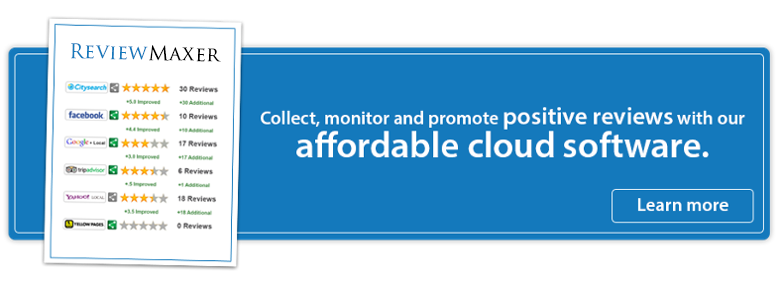 The most important lesson from what you will read in this post is this: “The customer is always right, even when he’s potentially wrong.”
The most important lesson from what you will read in this post is this: “The customer is always right, even when he’s potentially wrong.”
Many business owners will give a good eye-roll at that and click away from this page, but let us assure you that consumer reviews – positive or negative – are mission critical for any business. We trust the opinions of others – even strangers – when we’re in the market for a new car, blender, mattress, power drill, jeans, hotel or pair of shoes.
A ReviewInc.com survey conducted in 2013 reported that 34.9 percent of respondents preferred to consult reviews on sites like Google+, Yahoo and Yelp before making a decision about a business service purchase. In the same survey conducted in November 2014, 36.4 percent indicated that reviews were most important. This demonstrates a notable increase in our dependency on online opinions.
Why are consumer reviews so important?
1. They create a perception about a business or product. How people react to your product or service shapes your brand reputation. We each formulate our opinions based upon personal experiences, yet often before we buy, we seek to get a feel for how others perceive the benefits, usefulness or enjoyment a product or service offers. This is probably the reason “perception is reality” became so prevalent a turn of phrase.
2. They influence future business and sales. Positive consumer reviews typically result in increased (or, at a minimum, steady) sales. When people feel they’re getting a great deal or an exceptional product, positivity spreads like wildfire. Negative opinions spread equally as quickly, ensuring an opposite and much less desirable impact on sales and reputation. It’s a very basic formula.
3. They provide fodder for competitors. When competitors see rivals failing in some way, it can provide them an opportunity to kick them while they’re down. For example, say two steakhouses compete for the same clientele. Steakhouse One receives poor reviews from several customers who feel the restaurant is lacking due to the quality of the beef it sources for its entrees. Steakhouse Two could then promote its Grade A or organic, grass-fed beef options, thus luring clientele away and through its own doors.
4. They have potential for long-lasting impact. Once comments – positive or negative – appear online, they can stay visible and searchable for quite some time – indefinitely, even. Business owners cannot easily remove reviews, and most review site policies enforce this truth. If a consumer has a negative experience and she wields her “digital ink,” the virtual pen will prove more powerful than a sword.
5. They can become a catalyst for legal action. It’s not surprising that when others review our business, we take all comments – good and bad – seriously. Glowingly positive consumer reviews naturally bolster our egos. However, when negative opinions about customer service, product functionality, décor or professional ability surface, those opinions become an anchor around our necks. In some cases, business owners have taken to social media in a counterattack or, worse, threatened or executed legal action based upon a negative review. Though it is challenging to prove libel in a court of law, some businesses feel this is the only way to combat the stringent restrictions of online reviews.
The Holy Grail of reputation management is a positive word-of-mouth referral and, to earn it, businesses must operate efficiently, effectively and with precision. Unfortunately, not all businesses succeed, so occasionally, a slip here or a miss there results in a negative review and a simultaneous blow to the business’ reputation. Simply put, consumer reviews provide a standard: to be excellent all the time, every time.
Of course, not every day will be perfect. To better prepare your business, try these techniques to minimize potential damage to its reputation:
-
When you have an opportunity to respond, respond positively. It may pain you to withhold your defensive tongue, yet a rousing back-and-forth with an unhappy customer never spells victory. Instead, consider personal outreach with an inquiry to determine why the customer was dissatisfied. If appropriate, deliver an apology. If no apology is warranted, attempt to understand why the consumer was unhappy and decide if remedy is possible.
-
Have a multi-step plan in place to shift unhappy customer mindsets. Does the customer have a valid concern/complaint? Can you easily replace the product the customer takes issue with? Businesses often have many ways to provide relief for unsatisfied consumers, so consider a few cost-effective steps that your business can take to keep as many satisfied customers as possible on board. For example, you could consider a full refund, free lodging for a night, complimentary tickets, VIP passes, free shipping or a replacement of the product.
-
If all else fails, leverage your positives. There may come a time when you simply cannot satisfy someone. No amount of remedy or apology (if warranted) will shift a stubborn mindset. In these cases, the optimal solution is to simply flood the Internet with positive articles, blog entries and similar related content. This will help counter harmful or negative reviews or posts.
In our Online Reputation Management guide, the Axia Public Relations team explains in detail optimal methods for managing brand reputations in the wide world of the Web. Download your copy today or contact us to learn how we can help improve how your audiences perceive you in the digital realm.
Wendy Bulawa Agudelo has more than 15 years of experience in technology, business, consumer and non-profit public relations. In addition serving on the Massachusetts Down Syndrome Congress PR Task Force, Wendy enjoys cooking and rooting for her favorite New England sports teams.
Featured image credit: 123rf.com
Topics: public relations, online review management



Comment on This Article